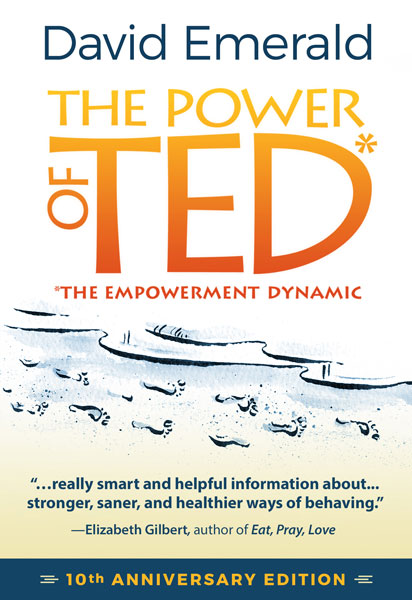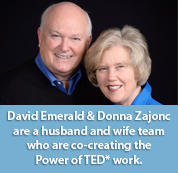We human beings are attached to being attached. We are attached to our thinking and the way we believe people and circumstances
ought to be. We are also attached to the norms and beliefs of the groups and organizations to which we belong.
David often
speaks to the difference between attachment, detachment, and
non-attachment, a distinction he learned from a friend who has been a longtime practicing Buddhist.
A characteristic of feeling
attached is that we must have it “my way,” which fuels the fixed, win-or-lose mindset.
Attachment invariably leads us into the Dreaded
Drama Triangle (DDT) and its reactionary roles of Victim, Persecutor,
and Rescuer.
Each DDT role has its attachments. When attached to being right or in control, we likely will be perceived by others as a Persecutor.
The Rescuer role pops up when we are attached to fixing or taking care of the Victim or protecting them from a Persecutor. When in the Victim role, we become attached to.…..well, being a Victim, and blaming the Persecutor (be it a person, condition, or circumstance)
for our situation.
The opposite of attached is detached and has the quality of “I don’t care.” When we are detached, we stand back, disengage and
sometimes have an aloof or “whatever” mentality.
Being non-attached is quite different than either of the previous two. Non-attachment is the “middle way” in which we care
and stay connected to what we want, while not being attached to a particular way something or someone has to be. As we seek to cultivate a life and relationships that are centered in TED*
(*The Empowerment Dynamic)®,
freedom and choice comes from practicing non-attachment.
When we have the quality of non-attachment, we are open to letting something emerge that we are not directing and trying to
control. This requires being willing to embrace “not knowing,” which our personalities often resist.
The personality only knows the past and attachment is based on that prior experience. When we can allow for broader possibilities
than those we are currently attached to, we start appreciating different kinds of experiences. The purpose of non-attachment is to eliminate the barriers in our minds that prevent new possibilities. Innovation can then emerge.
Also, if we truly see and treat others as Creators,
we can let go of our attachment because we know that they are ultimately responsible and accountable for the choices they make. We can be a Challenger or
a Coach,
while leaving the power with them as they create outcomes and choose responses to their experience.
Here is a metaphor to illustrate the danger of being attached. What if a butterfly got attached to remaining a caterpillar? If
the caterpillar is happy staying a caterpillar it might attach itself to the idea that it simply wants to be a better caterpillar. Maybe it can learn to crawl a little faster or turn to its left or right with a little more precision. Because it is attached
to being a caterpillar, it doesn’t yet realize it can fly with a gorgeous pair of wings. Instead it says to itself: “I can’t fly because I don’t have wings, so I will stay a caterpillar.”
As silly as this metaphor may sound, there are all kinds of ways we can stay attached to what we know – or think we know.
As we let go of our attachments to how we define ourselves other people and situations, we cultivate the power of non-attachment
that, in turn, nurtures our capacity as Creators, Challengers and Coaches. We remind ourselves each day that learning non-attachment puts us on the path of personal freedom.
Like
this article? Check out our Archives for more TED* Works!
Learn
more about TED* - www.powerofted.com








